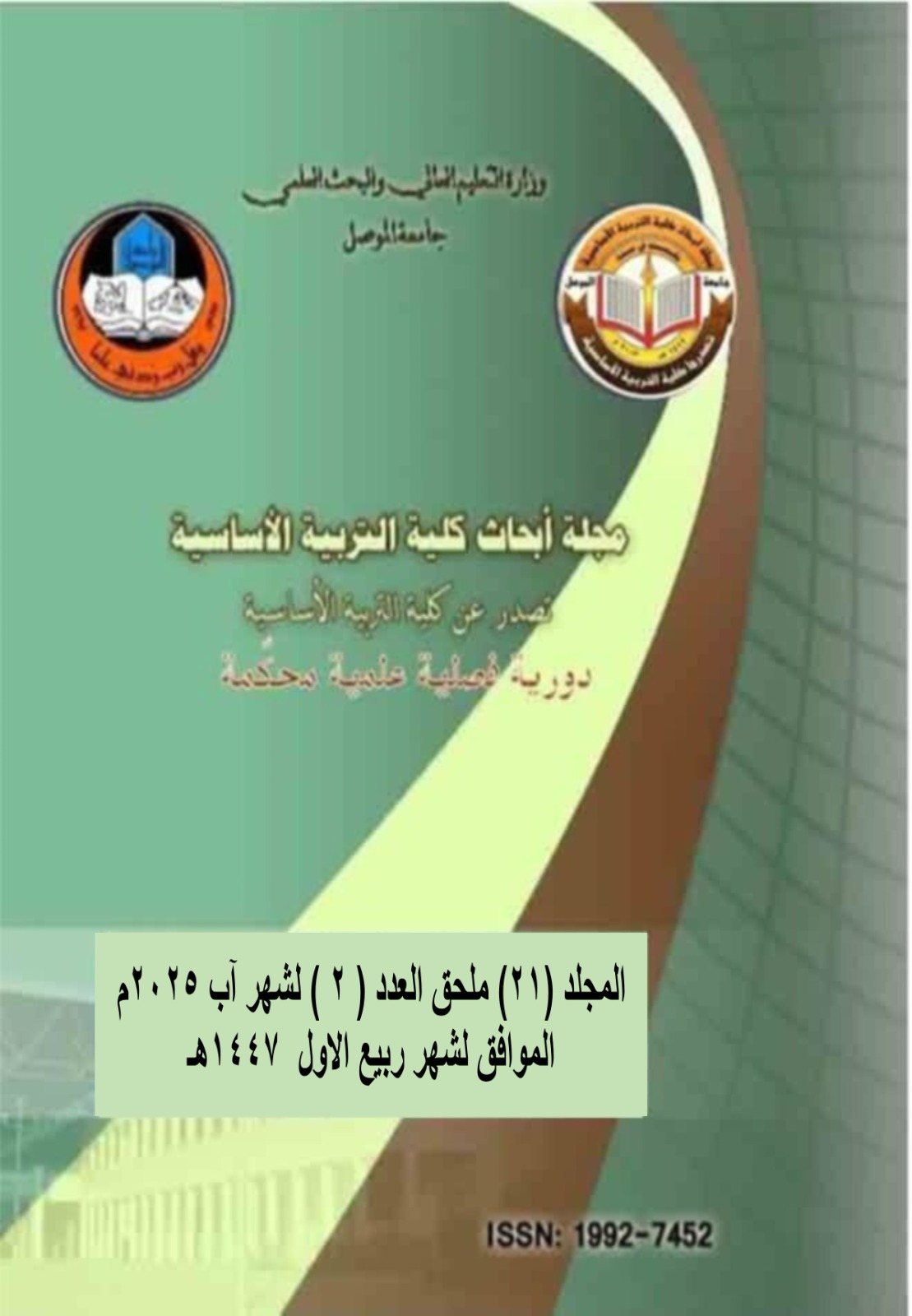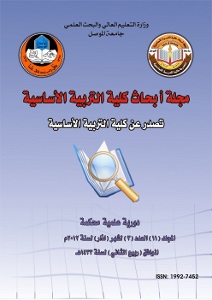Psychological weaning and its relationship to the (psychological-social) status of students in the Department of Special Education
Abstract
The current research aims to identify the level of psychological weaning and the level of (psychological-social) status and the relationship between them among students in the Department of Special Education. The research sample consisted of (60) male and female students selected using a stratified random sampling method. To achieve these objectives, the researcher used two ready-made tools: the first is the Al-Taie scale (2013) to identify psychological weaning, which consists of (30) items in its final form with three alternatives (agree, neutral, disagree). The (Mutashar, 2020) scale for identifying the (psychological-social) status, consisting of (37) items in its final form with four alternatives (applies to me to a large extent, applies to me to a medium extent, applies to me to a small extent, does not apply to me). The researchers extracted the apparent validity of the two scales by presenting them to a group of experts in the field of educational and psychological sciences. Then, the researchers extracted the reliability by retesting, where the reliability coefficient for psychological weaning reached (0.90), while for the (psychological-social) status (0.92). The data were statistically processed using appropriate statistical methods and the Statistical Package for Humanities and Social Sciences (SPSS) program. The researchers reached the following results: Students of the Special Education Department have psychological weaning, but to a small extent. They also have a good level of (psychological-social) status. The results also showed that there is a positive and good correlation between the two variables. At the end of their research, the researchers reached a set of recommendations and proposals.
The current research aims to identify the level of psychological weaning and the level of (psychological-social) status and the relationship between them among students in the Department of Special Education. The research sample consisted of (60) male and female students selected using a stratified random sampling method. To achieve these objectives, the researcher used two ready-made tools: the first is the Al-Taie scale (2013) to identify psychological weaning, which consists of (30) items in its final form with three alternatives (agree, neutral, disagree). The (Mutashar, 2020) scale for identifying the (psychological-social) status, consisting of (37) items in its final form with four alternatives (applies to me to a large extent, applies to me to a medium extent, applies to me to a small extent, does not apply to me). The researchers extracted the apparent validity of the two scales by presenting them to a group of experts in the field of educational and psychological sciences. Then, the researchers extracted the reliability by retesting, where the reliability coefficient for psychological weaning reached (0.90), while for the (psychological-social) status (0.92). The data were statistically processed using appropriate statistical methods and the Statistical Package for Humanities and Social Sciences (SPSS) program. The researchers reached the following results: Students of the Special Education Department have psychological weaning, but to a small extent. They also have a good level of (psychological-social) status. The results also showed that there is a positive and good correlation between the two variables. At the end of their research, the researchers reached a set of recommendations and proposals.
References
- أبو جادو ، صالح محمد (2011) :علم النفس التطوري ( الطفولة والمراهقة ) دار المسيرة للنشر والتوزيع ، عمان ، الأردن
- أبو خالد ، انوار عبد الله (2017) :اخلية الطفولة ، الفطام النفسي ، جريدة الرياض ، مؤسسة اليمامة الصحفية ، السعودية
- بشرى ، عبد الحسين (2011) : المكانة الاجتماعية لدى تدريسي جامعة بغداد ، مجلة العلوم النفسية العدد (19)
- الحنفي ، (2005 ) :موسوعة علم النفس والتحليل النفسي ، مجلد 3 ، ط، 1 ، بيروت ، لبنان
- الخفاجي ، زينب حياوي (1996): قياس الامن النفسي لموظفي وموظفات الدولة ( رسالة ماجستير غير منشورة ) كلية الآداب ، جامعة بغداد
- داؤود ، عزيز حنا والعبيدي ، ناظم هاشم (1990) : علم النفس الشخصية ، مطابع التعليم العالي ،الموصل
- راجح ، احمد عزت (2009) : أصول علم النفس ، ط . 7 ، دار الكاتب العربي للطباعة والنشر
- الربدي والبليهي ، سفيان بن إبراهيم ، هيفاء بنت عبد الرحمن (2023 ) : الفطام النفسي لدى طالبات المرحلة الثانوية في مية بريدة في ضوء بعض المتغيرات الديموغرافية
- شلتز ، دران ( 1983) : نظريات الشخصية ترجمة حمد دلي الكربولي وعبد الرحمن القيسي ، بغداد مطبعة بغداد ، العراق
- الصالحي ، ميادة عبد الحسن (2005 ): الامل وتحقيق الأهداف وعلاقته بالمكانة النفسية والاجتماعية لدى طلبة الجامعة ، أطروحة دكتوراه غير منشورة كلية الآداب جامعة بغداد
- صفر ، أسماء حيدر ( 2023 ) : الإصرار على الحياة وعلاقته بالمكانة ( النفسية _ الاجتماعية ) لدى طلبة جامعة الموصل ، العراق
- الطريا ، احمد وعد الله حمد الله (2013) : الفطام النفسي لدى طلبة المرحلة الإعدادية في ضوء بعض المتغيرات الديمغرافية والتربوية ، مجلة جامعة تكريت للعلوم ، كلية التربية ، جامعة تكريت ، مجلد 20 ، العدد
- العارضي ، عماد عبد الأمير نصيف ( 2004) : المكانة الاجتماعية للمرأة من وجهة نظر الرجل والمرأة ، ( رسالة ماجستير غير منشورة ) الآداب ، جامعة بغداد
- عباس ، محمد خليل ، واخرون (2009) : مدخل الى مناهج البحث في التربية وعلم النفس ،ط2 ، دار المسيرة للنشر والتوزيع والطباعة ، عمان الأردن
- عبد الرحمن ، محمد السيد (1998): نظريات الشخصية دار قباء للطباعة والنشر والتوزيع القاهرة
- العجيلي ، صباح حسين واخرون (1996) : التقويم والقياس ، جامعة بغداد ، العراق
- عودة ، احمد سليمان وخليل يوسف الخليلي (2000) : الإحصاء للباحث في التربية والعلوم الإنسانية ، مكتبة المنار للنشر والتوزيع ، عمان ، الأردن
- العيسوي ، عبير محمد عطية (2020) : الفطام النفسي وعلاقته بالاكتئاب لدى طلاب جامعة 6 أكتوبر
- الفقي ، إبراهيم ( 2008 ) : فن واسرار اتخاذ القرار ، ط . 1 دار التوثيق للطباعة والنشر ، دمشق
- كاظم ،علي محمود (2014) : الفطام النفسي لدى طلبة المرحلة الإعدادية : قياسه وانتشاره ، مجلة الآداب ، جامعة بغداد ، كلية الآداب
- كفافي ، علاء الدين (1998) : رعاية نمو الطفل ، دار قباء ، القاهرة
- كونزن بيتر (2010 ) : البحث عن الهوية ، الهوية وتنشئتها في حياة أريك اريكسون واعماله
- الناشي، علي خيون عباس (2020 ) :تأثير برنامج إرشادي بالعلاج الواقعي في تنمية الفطام النفسي لدى طلاب المرحلة الإعدادية
- النجار ، نبيل جمعة (2010) : القياس والتقويم منظور تطبيقي مع تطبيقات برمجية
- Cartwright , DST . (1979) : Theories and Models of personality , WM .C. Brown company publishers , Dubuque , Lowe
- Champion ,D. J., Kurt , S.B., Hastings ,D. W. Harris, D.K ., (1984) : Sociology , CBS college publishing. New York
- Huntington , jean ,M , (1957) : the Development of A professional self- image .in the student – Physician: introductory studies in the sociology of medical education , edited by Robert . k Merton , George , Gore . G,reader and Patricia, L, Kendall Cambridge , Mess : Harvard Univ . press, 19
- Loan , Mann ,(1969) : social Psychology . John Wiley and sone
- Moore . De Wayne (1987) : parent-adolescent separation: The construction of Adulthood by late Adolescents . Journal of Developmental psychology ; vol. 23. No. 2.p 298_ 307






